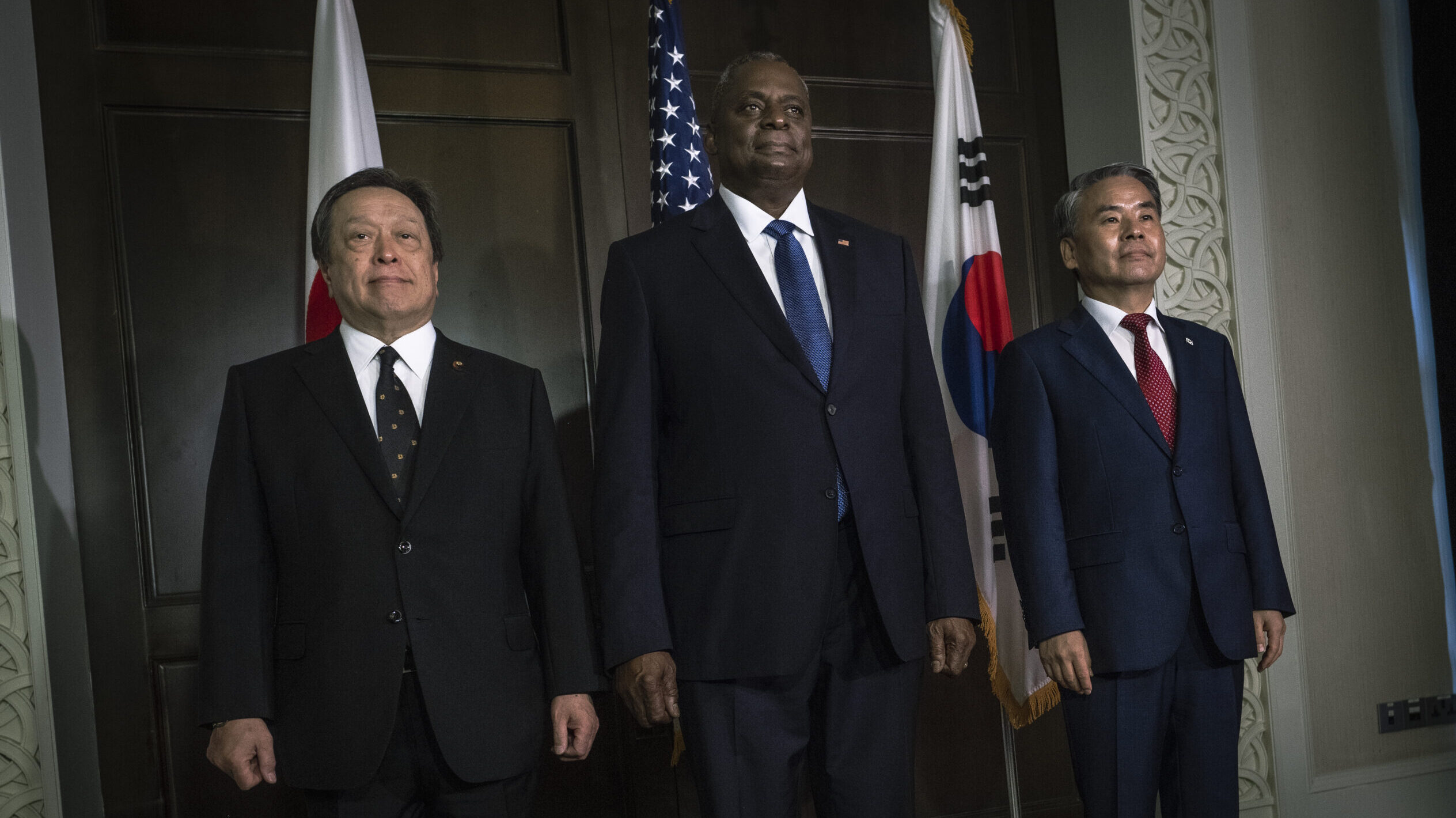
Japanese Defense Minister Yasukazu Hamada, Secretary of Defense Lloyd J. Austin III and Republic of Korea Minister of National Defense, Lee Jong-Sup pose for photos prior to their tri-lateral meeting at the International Institute for Strategic Studies (IISS) 20th Shangri-La Dialogue in Singapore, June 3, 2023. (Chad J. McNeeley)McNeeley)
SHANGRI-LA DIALOGUE — The defense leaders of the United States, Japan and South Korea today agreed “to activate a data sharing mechanism to exchange real-time missile warning data before the end of the year in order to improve each country’s ability to detect and assess missiles launched by” North Korea.
Defense Secretary Lloyd Austin, Japanese Minister of Defense Hamada Yasukazu, and South Korean Minister of Defense Lee Jong-Sup shared “deep concerns about, and condemnation of, the DPRK’s weapons of mass destruction and ballistic missile programs,” using diplomatic language that indicates more than the usual worry.
In a joint statement, the three leaders condemned North Korea’s “recent claimed space launch using ballistic missile technology” and pledged to broaden their cooperation. The United States, in a rare mention of nuclear weapons, “reaffirmed its steadfast alliance commitments to Japan and the ROK backed by the full range of U.S. capabilities, including nuclear.”
“Japan, South Korea the United States — all are seeing North Korea’s activities in the last year, year-and-a half as a return to a very provocative era,” Brent Sadler, a naval and Asia expert at the Heritage Foundation in Washington said in the lobby of the Shangri-La Hotel, where the eponymous event is held. “So they’re starting to go back to an old new normal, the old word pressure campaigns of the past. I think we’re going to see maybe a return to some of that. That’s why they mentioned nuclear.”
He noted the extraordinary visit last month of a nuclear ballistic missile submarine to the South Korean port of Pusan. Notably, there was a delegation of both South Korean and Japanese officials who went on board.
RELATED: S. Korea, US nuclear agreement big ‘first step,’ but might not curb long-term nuclear aspirations
Sadler, a former nuclear submariner, said it was “very unusual” to have dignitaries from two different countries aboard a US nuclear submarine at one time. He believes it was done to help cement the US alliance with the year-old administration of South Korean President Yoon Suk Yeol as well as celebrate the “new, more positive relationship between Tokyo and Seoul.”
Much of the data for improved missile defense targeting will come as a result of the reinvigorated General Security of Military Information Agreement (GSOMIA), a bilateral agreement between South Korea and Japan that America has long supported.
The statement issued today goes beyond the North Korean threat to include “other (unnamed) regional security issues” as well as “deepening trilateral cooperation on key issues to promote a free and open Indo-Pacific, including information sharing, high-level policy consultations, and trilateral exercises.” The three nations further discussed steps to follow up on these issues.
The three countries also committed “to swiftly conduct maritime interdiction exercises and anti-piracy exercises.” That’s interesting, as there haven’t been much in the way of anti-piracy operations in this region since the 2004 tsunami wiped out many of the ports and villages where many of the pirates were based.
Finally, the allies “shared concerns on activities that are inconsistent with international law, in particular the United Nations Convention on the Law of the Sea and stressed the importance of fully respecting international law, including freedom of navigation and overflight and other lawful uses of the sea.” Anytime there is mention of the Convention of the Law of the Sea, that can be read as a shot at China.








